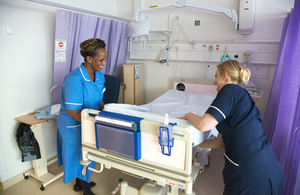Clampdown on NHS staffing agency costs
A cap on charges for agency staff will reduce NHS spend by £1 billion over 3 years, and agency staff will be no better off than NHS colleagues.

Nurses changing bed
A tough further clampdown on staffing agencies and highly-paid NHS managers employed through agencies has been announced by Health Secretary Jeremy Hunt today.This will cap the amount companies can charge per shift for all staff, including doctors and non-clinical personnel. Additionally, NHS regulators will be setting expectations on overall levels of agency spend for each NHS organisation.
Building on previously announced controls, which introduced mandatory use of frameworks for nursing staff and will introduce a cap on nursing spend coming into force shortly, these new measures will remove £1 billion from agency spending bills over 3 years so that savings can be re-invested in frontline patient care.
A new hourly price cap will now be introduced for all types of agency staff, in addition to the nursing cap announced in June, ending the practice of some agencies charging up to £1,800 for a standard shift for a nurse and £3,500 for a weekend shift for a doctor.
The caps will be ratcheted down over time, so that in future agencies cannot charge the NHS a shift rate that is more than the hourly rate paid to existing substantive doctors, nurses and other clinical and non-clinical staff. The measures will ensure staff who undertake short-term agency work will ultimately not be rewarded better than those in substantive posts, which provides better continuity of care for patients.
That means no more agencies charging more than 3 times what a doctor might earn for a normal shift or expecting an hourly rate of more than £50 for a nurse who would usually be paid approximately £15 an hour.
Tackling high-cost staffing agencies is part of a package of measures which will help to cut costs so that every penny can be reinvested in frontline care and towards delivering a truly 7 day NHS.
Remuneration for interim very senior managers paid on an agency basis will also be subject to the Monitor / Trust Development Authority (TDA) consultancy approvals process. NHS England will take an equivalent approach for clinical commissioning groups.
The caps sit alongside strict new rules announced earlier this year which include mandatory use of agencies from frameworks, putting a defined cap on total agency staff spending for all NHS trusts and each foundation trust receiving interim support from the Department of Health or in breach of their licence for financial reasons, and a requirement to obtain specific approval for any consultancy contracts over £50,000.
The cap will be introduced on 23 November, subject to responses from a consultation by Monitor/TDA. To begin with, caps will be set slightly higher than the pay that substantive staff receive but will be gradually reduced to the same level as substantive staff by April next year. This gradual reduction in the cap will mean trusts are better able to manage this change.
The full range of financial controls will help the NHS bring down spiralling agency staff bills - which cost the NHS £3.3 billion last year, more than the cost of all that year’s 22 million Accident and Emergency (A&E) admissions combined.
The price caps have been developed with, and are supported by, clinical leaders in the Care Quality Commission (CQC) and NHS England. Trusts will be able to override caps where absolutely necessary to protect patient safety. Any overrides will be subject to scrutiny by Monitor and the NHS Trust Development Authority to ensure these situations are appropriate.
Monitor and TDA will shortly publish guidance on the price caps for agency staff in the NHS and launch a consultation on the rules, the specific caps and the associated impact assessment.
Health Secretary Jeremy Hunt said:
For too long staffing agencies have been able to rip off the NHS by charging extortionate hourly rates which cost billions of pounds a year and undermine staff working hard to deliver high-quality care. The tough new controls on spending that we’re putting in place will help the NHS improve continuity of care for patients and invest in the frontline - while putting an end to the days of unscrupulous companies charging up to £3,500 a shift for a doctor.
Chief Inspector of Hospitals, Professor Sir Mike Richards, said:
Introducing the cap on the amount trusts pay agencies for staff is the right thing to do. I welcome the fact that this is being phased in, allowing staff and trusts time to adjust and minimising any risks to patient safety. Close monitoring will allow us to assess the impact on individual trusts. CQC will work closely with NHS Improvement to ensure ongoing patient safety.